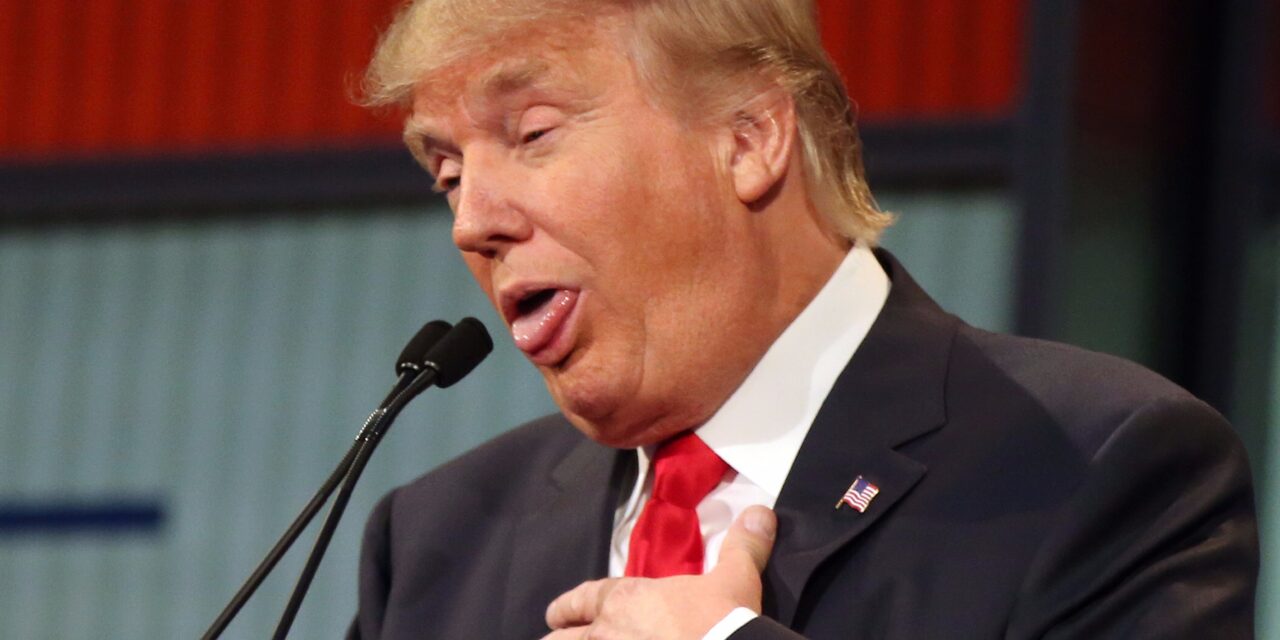
Republican front runner Donald Trump at the Conservative Political Action Conference 2012 displaying his usual facial expressions. (Photo courtesy of CPAC)
By Danny R. Johnson
WASHINGTON, DC – The annual Conservative Political Action Conference (CPAC) at National Harbor, Maryland, outside Washington, D.C. on March 3 through March 5, 2016, will test the viability and survival of CPAC, an organization which prides itself on showcasing the nation’s leading Republican conservative politicians, presidential aspirants, and anti-establishment cult figures.
The last time the Conservative Political Action Conference was held in the midst of a Republican presidential primary, the pressure was on Mitt Romney to convince conservatives that he had the right conservative credentials. It was 2012, and the easy-going front-runner had just lost nominating contests to former Sen. Rick Santorum in Minnesota, Missouri, and Colorado—the latest sign that the conservative movement had yet to fall in line behind that cycle’s establishment candidate. Romney met privately at CPAC with about 30 influential members of the movement to reassure them that his connection to conservatism was genuine. Romney was so eager to prove that he was one of them that, in his Friday morning speech, he memorably described his gubernatorial record as “severely conservative.”
The question that dogged Romney throughout the 2012 primary, and prevented him from quickly wrapping up the nomination against a distressingly weak field, was whether he was a suitable vessel for the conservative movement. CPAC, that movement’s largest annual gathering, was the natural place to adjudicate this. It was a central moment in the primary.
Is Donald Trump conservative enough? Is not a question this year’s front-runner seems preoccupied with—and he’s dominating anyway. That means that CPAC 2016, which begins in earnest on Thursday, isn’t nearly as important this time around.
To look at the schedule for the three-day conference is to look at a movement in denial. There’s no indication on paper that a television-performing nationalist is overthrowing conservatism as the engine of the Republican Party. One early Thursday panel, “Three Approaches to Conservatism,” featuring U.S. Senator Ben Sasse, Rick Santorum, U.S. Senator Ted Cruz’s chief of staff, and libertarian presidential candidate Gary Johnson, is probably not going to delve into the conservative literature behind Donald Trump’s approach of calling his rivals mean names on television.
U.S. House of Representatives Speaker Paul Ryan’s session about conservative approaches to poverty will offer few ideas that migrate into Donald Trump’s nonexistent policy platform. What use does a panel like “Political Islam: How Patriotic American Muslims Defy the Radical Islamists” have in a party whose voters, encouraged by Trump, don’t believe that there is such a group as “patriotic American Muslims”? The panel on “How to Grow Conservatism” will have its work cut out for it, now that Trump’s candidacy has revealed how the real motivating force behind the Republican Party is nationalism and #winning instead of ideological conservatism.
If the nomination was being fought over candidates’ fidelity to movement conservatism, Trump would be dead. For the last month or so, Ted Cruz, a real movement guy, has been relentlessly prosecuting the case that Donald Trump is unreliably conservative. Trump defends Planned Parenthood; he’s argued that he’d broker an Israeli-Palestinian peace deal from a position of neutrality; he has donated to dozens of Democrats and Democratic groups in the past; he believes eminent domain is just terrific; and he does not really speak at all about reducing the size of the federal government. Cruz has made this case ably, and it hasn’t affected Trump’s strength. It’s helped Cruz win pluralities of self-described “very conservative” voters in primaries, but that’s pennies compared to what Trump has built.
Expect Trump to be greeted with some coldness at CPAC when he delivers his speech Saturday morning. He will throw out some sops to conservatives, mostly about his immigration proposals. But he doesn’t need to. The conservative movement’s opinion is of little value to Trump. That is going to make this CPAC at once a historic snapshot of a movement in existential crisis, and unusually irrelevant to the outcome of the Republican presidential race.
Danny R. Johnson is San Diego County News’ National News Correspondent.


